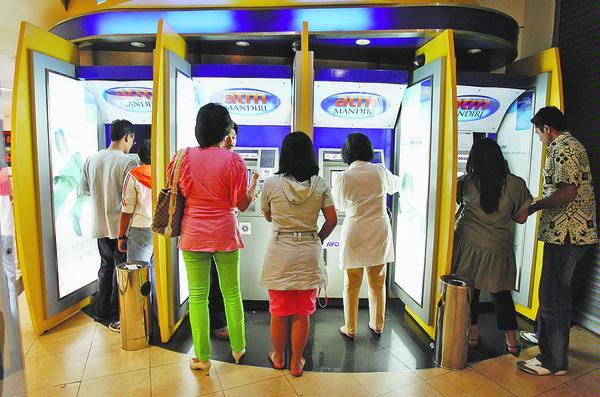Indonesia's banking sector is becoming a magnet for foreign firms willing to accept an uncertain investment environment in return for booming growth and an untapped market of tens of millions. Major players are watching with interest the outcome of DBS Group of Singapore's trail-blazing US$7.3 billion deal struck on April 2 to acquire Bank Danamon Indonesia, the nation's fifth-largest bank. Underlining the uncertainties, the central bank declined to approve the deal until it establishes new rules on foreign ownership, which currently allow local and foreign investors to own up to 99 percent of Indonesian banks.
Bank Indonesia also said investors would require separate licences for different services, such as taking deposits, setting up ATMs and opening branches. A green light on the closely watched deal, which highlights the eagerness of major institutions to expand in Indonesia, would give foreign firms more confidence to invest in an economy that posted 6.5 percent growth last year. "Indonesian banks are attractive because they are growing much faster than foreign banks," said Harry Su, head of research at Jakarta-based brokerage Bahana securities.
"DBS' current return on investment is around 10 percent, while Danamon's is around 15 percent," he said. The growth gap between Indonesia's banking sector and Western institutions struggling to emerge from the downturn and debt crisis is expected to widen in decades to come, according to a report by PricewaterhouseCoopers (PwC). Indonesia's banks are growing at a phenomenal rate, much faster than in Europe and the United States, the report said. Indonesia's domestic banking assets are tipped to grow to US$5.1 trillion by 2050 from US$187 billion in 2009 -- a 27-fold increase. Over the same period, US assets are expected to expand just three-fold to US$46.5 trillion.
"Indonesia's banking sector is currently the best performer in Southeast Asia, especially in profitability," said Iwan Wisaksana, an analyst at Fitch Ratings Indonesia. DBS' bid for Danamon is in line with plans by Southeast Asia's biggest bank to tap into emerging Asia, as it can no longer grow organically in Singapore where market penetration is already high, Su said. By contrast, only around half of Indonesians aged over 15 have bank accounts, authorities say, leaving an untapped market of around 60 million including many now joining the middle class and requiring financial services. "Look at penetration in Asia -- Indonesia would be one of the lowest. Even countries like India that have low penetration are above 50 percent," Standard & Poor's analytical manager for emerging Asia, Geeta Chugh, told AFP.
International interest has been spurred by a number of factors including the lenient foreign ownership laws that were introduced to boost investment after the 1997-98 Asian financial crisis. The recent doldrums in the West have made buoyant regional economies like Indonesia's even more attractive, and prompted investors to re-calculate the rewards against the risks posed by opaque legislation and widespread official corruption. Indonesian authorities say that investor confidence has also been boosted in recent months since ratings agencies Moody's and Fitch bumped Indonesia to investment grade after long years of junk status. The DBS deal would be the largest bank acquisition in Indonesia's history, but other foreign investors have also been making forays. Commonwealth Bank Australia announced last year it would almost double the number of branches in Indonesia from around 80 to 150 over the next few years. London-based HSBC, which began banking in
Indonesia in the late 19th century, acquired an 89 percent stake in local Bank Ekonomi Raharja in 2009, making it then the third-biggest foreign bank by assets in Indonesia. Smaller institutions like Bank Ina Perdana, Bank Mestika Dharma and Bank Maspion are all reportedly being eyed by investors who are awaiting a resolution on the ownership regulations. Opposition to the Danamon deal is an echo of a recent nationalist outburst over the mining industry, which prompted parliament to pass a law in February capping foreign ownership at 49 percent after 10 years of production. Suggestions that the ownership cap could also be tightened for banks have fuelled uncertainty over the sector's regulatory environment, said PwC Indonesia's technical adviser for banking Ashley Wood. A PwC survey of 100 executive bankers in Indonesia released last month showed that the regulatory environment was the top obstacle to growth in the banking sector. "The opportunities here are fantastic, but that comes with a cost," Wood said.
AFP/ir
Cek berita, artikel, dan konten yang lain di Google News













